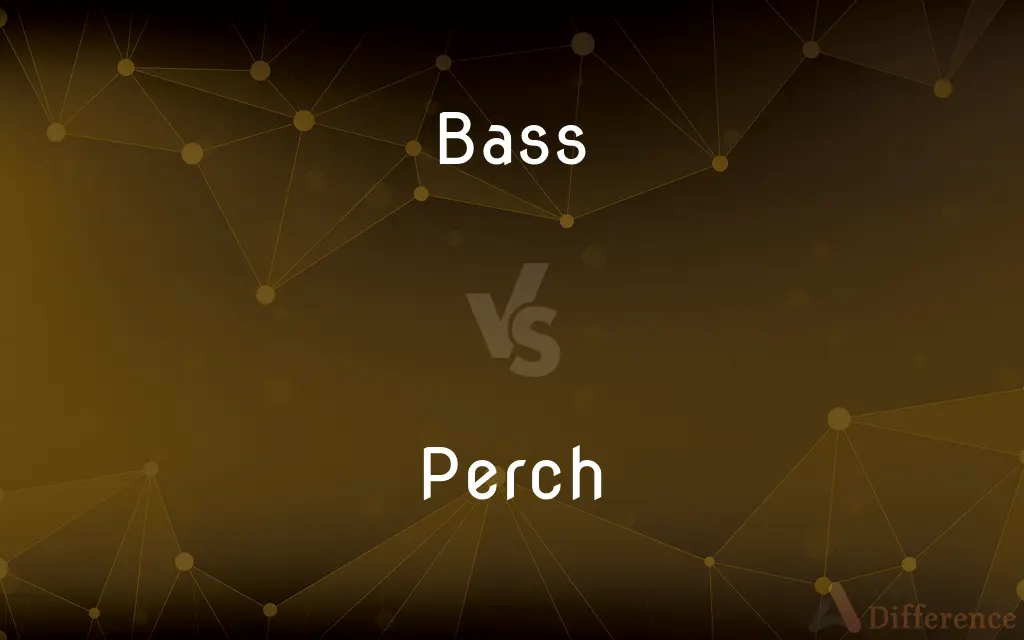Bass vs. Perch — What's the Difference?
By Fiza Rafique & Maham Liaqat — Updated on April 1, 2024
Bass are aggressive predators, often found in warm, murky water, while perch prefer cooler, clear waters and are known for their schooling behavior.

Difference Between Bass and Perch
Table of Contents
ADVERTISEMENT
Key Differences
Bass, a term often referring to several species within the freshwater and marine environments, are known for their predatory nature, adapting well to various habitats but favoring warmer, murkier waters. These fish are sought after by anglers for their fight and size, making them popular in sport fishing. Perch, on the other hand, belong primarily to the freshwater genus Perca and are widely recognized for their distinct vertical stripes and spiny dorsal fins. These fish prefer cooler, clearer waters compared to bass and are often found in schools, which is a behavior not typically seen in bass.
Bass have a diverse diet, consuming everything from smaller fish to crustaceans, depending on their size and species. The largemouth bass, in particular, is renowned for its aggressive feeding behavior, often becoming the top predator in its ecosystem. Perch are also popular among anglers, but they are generally smaller and considered less aggressive. Their diet mainly consists of small invertebrates and fish larvae, although larger perch will prey on smaller fish.
While both bass and perch are valued by fishermen for different reasons, their environmental preferences highlight a significant distinction between the two. Bass' adaptability allows them to thrive in a variety of water conditions, including both clear and turbid environments, although they have a preference for warmer waters. Perch, with their preference for cool, clear water, tend to inhabit lakes, rivers, and streams with well-oxygenated water, showcasing their adaptability to colder environments.
The feeding habits of bass and perch also reflect their differences in size and aggression. Bass, especially species like the largemouth bass, are known for their wide mouths and ability to consume prey almost half their size. This contrasts with perch, which due to their smaller size, focus on a diet of invertebrates and are more likely to use schooling as a defensive mechanism rather than as a predatory advantage.
In terms of sport fishing, both bass and perch offer unique experiences. Bass fishing is often associated with the excitement of catching a large, aggressive fish, using techniques that mimic the prey bass are attracted to. Perch fishing, while perhaps less exhilarating in terms of the fight, can offer the joy of catching multiple fish in a schooling situation, appealing to anglers who enjoy finesse fishing.
ADVERTISEMENT
Comparison Chart
Water Preference
Warm, murky waters
Cooler, clear waters
Behavior
Aggressive, solitary predators
Schooling, less aggressive
Diet
Diverse, including fish and crustaceans
Small invertebrates, fish larvae
Fishing Appeal
Sought after for their size and fight
Valued for the experience of catching schooling fish
Habitat Adaptability
Thrive in various conditions, prefer warmth
Prefer cooler, well-oxygenated waters
Compare with Definitions
Bass
A predatory fish known for its aggressiveness and size.
The angler was thrilled to catch a large bass after hours of fishing.
Perch
Smaller than bass, with a diet consisting mainly of invertebrates.
The perch feeds primarily on invertebrates found in the lakebed.
Bass
Popular in sport fishing for their challenging catch.
Fishing for bass requires skill, as they are known for their strength.
Perch
A freshwater fish known for its vertical stripes and schooling behavior.
We spotted a school of perch near the lake's edge, easily identifiable by their stripes.
Bass
Consumes a wide range of prey.
Bass diet includes smaller fish, making them top predators in their habitat.
Perch
Prefers cooler, clearer waters.
Perch thrive in the clear, cool waters of northern lakes.
Bass
Characterized by a large mouth and robust body.
The largemouth bass is distinguished by its sizable mouth, useful for preying on large items.
Perch
Popular among anglers, especially in cooler climates.
Perch fishing is a favorite winter activity on the ice-covered lake.
Bass
Found in freshwater and marine environments, adaptable to various conditions.
Bass can often be found in both clear and murky waters, depending on the species.
Perch
Utilizes schooling as a defense mechanism.
When threatened, perch quickly gather into schools to confuse predators.
Bass
Denoting the member of a family of instruments that is the lowest in pitch
A bass clarinet
Perch
Perch is a common name for fish of the genus Perca, freshwater gamefish belonging to the family Percidae. The perch, of which three species occur in different geographical areas, lend their name to a large order of vertebrates: the Perciformes, from the Greek: πέρκη (perke), simply meaning perch, and the Latin forma meaning shape.
Bass
The low-frequency output of a radio or audio system, corresponding to the bass in music.
Perch
A rod or branch serving as a roost for a bird.
Bass
The common European freshwater perch.
Perch
An elevated place for resting or sitting.
Bass
Any of a number of fish similar to or related to the perch.
Perch
A position that is secure, advantageous, or prominent.
Bass
Another term for bast
Perch
A pole, stick, or rod.
Bass
Any of various North American freshwater fishes of the family Centrarchidae, especially the largemouth bass and the smallmouth bass.
Perch
A linear measure equal to 5.50 yards or 16.5 feet (5.03 meters); a rod.
Bass
Any of various marine fishes especially of the families Serranidae and Moronidae, and including the sea basses and the striped bass.
Perch
One square rod of land.
Bass
A male singing voice of the lowest range.
Perch
A unit of cubic measure used in stonework, usually 16.5 feet by 1.0 foot by 1.5 feet, or 24.75 cubic feet (0.70 cubic meter).
Bass
A singer who has such a voice.
Perch
A frame on which cloth is laid for examination of quality.
Bass
An instrument, especially a double bass or bass guitar, that produces tones in a low register.
Perch
Any of several spiny-finned freshwater fishes of the genus Perca, especially either of two edible species, the yellow perch of North America, and P. fluviatilis of Europe.
Bass
A vocal or instrumental part written in a low register.
Perch
Any of various similar fishes of the family Percidae, such as the walleye, or of other families, such as the white perch or the ocean perch.
Bass
A low-pitched sound or tone
The deep bass of trucks braking on the highway nearby.
Perch
To alight or rest on a perch; roost
A raven perched high in the pine.
Bass
The tones in the lowest register of an instrument
A piano that is weak in the treble but has a very full sound in the bass.
Perch
To stand, sit, or rest on an elevated place or position.
Bass
Having a deep tone.
Perch
To place on or as if on a perch
The child perched the glass on the edge of the counter.
Bass
Low in pitch.
Perch
To lay (cloth) on a perch in order to examine it.
Bass
Of sound, a voice or an instrument, low in pitch or frequency.
The giant spoke in a deep, bass, rumbling voice that shook me to my boots.
Perch
Any of the three species of spiny-finned freshwater fish in the genus Perca.
Bass
A low spectrum of sound tones.
Peter adjusted the equalizer on his audio equipment to emphasize the bass.
Perch
Any of the about 200 related species of fish in the taxonomic family Percidae, especially:
Bass
A section of musical group that produces low-pitched sound, lower than the baritone and tenor.
The conductor preferred to situate the bass in the middle rear, rather than to one side of the orchestra.
Perch
(South Africa) Acanthopagrus berda
Bass
One who sings in the bass range.
Halfway through middle school, Edgar morphed from a soprano to a bass, much to the amazement and amusement of his fellow choristers.
Perch
(Ghana) Distichodus engycephalus, Distichodus rostratus
Bass
(musical instrument) An instrument that plays in the bass range, in particular a double bass, bass guitar, electric bass or bass synthesiser.
The musician swung the bass over his head like an axe and smashed it into the amplifier, creating a discordant howl of noise.
Perch
(Australia) Johnius belangerii, Macquaria ambigua, Macquaria colonorum, Macquaria novemaculeata, Nemadactylus macropterus
Bass
The clef sign that indicates that the pitch of the notes is below middle C; a bass clef.
The score had been written without the treble and bass, but it was easy to pick out which was which based on the location of the notes on the staff.
Perch
(USA) Kyphosus azureus
Bass
The perch; any of various marine and freshwater fish resembling the perch, all within the order of Perciformes.
Perch
(UK) Lateolabrax japonicus, Tautogolabrus adspersus
Bass
The fibrous inner bark of the linden or lime tree, used for making mats.
Perch
Several similar species in the order Perciformes, such as the grouper.
Bass
Fibers from other plants, especially palm trees
Perch
A rod, staff, tree branch, ledge, etc., used as a roost by a bird.
Bass
Anything made from such fibers, such as a hassock, basket or thick mat.
Perch
A pole connecting the fore gear and hind gear of a spring carriage; a reach.
Bass
To sound in a deep tone.
Perch
(figuratively) A position that is secure and advantageous, especially one which is prominent or elevated.
Bass
An edible, spiny-finned fish, esp. of the genera Roccus, Labrax, and related genera. There are many species.
Perch
(figuratively) A position that is overly elevated or haughty.
Bass
The two American fresh-water species of black bass (genus Micropterus). See Black bass.
Perch
(dated) A linear measure of 2 yards, equal to a rod, a pole or 4 chain; the related square measure.
Bass
Species of Serranus, the sea bass and rock bass. See Sea bass.
Perch
A cubic measure of stonework equal to 16.6 × 1.5 × 1 feet.
Bass
The southern, red, or channel bass (Sciæna ocellata). See Redfish.
Perch
(textiles) A frame used to examine cloth.
Bass
The linden or lime tree, sometimes wrongly called whitewood; also, its bark, which is used for making mats. See Bast.
Perch
A bar used to support a candle, especially in a church.
Bass
A hassock or thick mat.
Perch
(theatre) A platform for lights to be directed at the stage.
Bass
A bass, or deep, sound or tone.
Perch
(intransitive) To rest on a perch (especially, of a bird); to roost.
The macaw was perched on Jim's shoulder.
Bass
The lowest part in a musical composition.
Perch
(intransitive) To sit upon the edge of something.
Bass
Deep or grave in tone.
Perch
(intransitive) To stay in an elevated position.
Bass
To sound in a deep tone.
Perch
(transitive) To place something on (or as if on) a perch.
Bass
The lowest part of the musical range
Perch
To inspect cloth using a perch.
Bass
The lean flesh of a saltwater fish of the family Serranidae
Perch
Any fresh-water fish of the genus Perca and of several other allied genera of the family Percidæ, as the common American or yellow perch (Perca flavescens syn. Perca Americana), and the European perch (Perca fluviatilis).
Bass
Any of various North American freshwater fish with lean flesh (especially of the genus Micropterus)
Perch
Any one of numerous species of spiny-finned fishes belonging to the Percidæ, Serranidæ, and related families, and resembling, more or less, the true perches.
Bass
The member with the lowest range of a family of musical instruments
Perch
A pole; a long staff; a rod; esp., a pole or other support for fowls to roost on or to rest on; a roost; figuratively, any elevated resting place or seat.
As chauntecleer among his wives allSat on his perche, that was in his hall.
Not making his high place the lawless perchOf winged ambitions.
Bass
Nontechnical name for any of numerous edible marine and freshwater spiny-finned fishes
Perch
A measure of length containing five and a half yards; a rod, or pole.
Bass
Having or denoting a low vocal or instrumental range;
A deep voice
A bass voice is lower than a baritone voice
A bass clarinet
Perch
A pole connecting the fore gear and hind gear of a spring carriage; a reach.
Perch
To alight or settle, as a bird; to sit or roost.
Wrens make prey where eagles dare not perch.
Perch
To place or to set on, or as on, a perch.
Perch
To occupy as a perch.
Perch
Support consisting of a branch or rod that serves as a resting place (especially for a bird)
Perch
A linear measure of 16.5 feet
Perch
A square rod of land
Perch
An elevated place serving as a seat
Perch
Any of numerous fishes of America and Europe
Perch
Spiny-finned freshwater food and game fishes
Perch
Any of numerous spiny-finned fishes of various families of the order Perciformes
Perch
Sit, as on a branch;
The birds perched high in the treee
Perch
To come to rest, settle;
Misfortune lighted upon him
Perch
Cause to perch or sit;
She perched her hat on her head
Common Curiosities
Can both bass and perch be found in freshwater?
Yes, both species are primarily freshwater fish, though some bass species can also live in marine environments.
What distinguishes bass from perch in terms of habitat?
Bass prefer warmer, sometimes murkier waters, while perch favor cooler, clear waters.
Are bass larger than perch?
Yes, bass are generally larger and more aggressive than perch.
What makes bass popular in sport fishing?
Their size, fight, and the challenge they present to anglers.
Why are perch considered less aggressive than bass?
Perch are smaller, with a diet focused on invertebrates, and use schooling for defense rather than aggressive predation.
What type of water do perch thrive in?
Perch thrive in cooler, well-oxygenated, clear waters.
Are there specific fishing techniques for catching bass?
Yes, techniques often involve mimicking the prey of bass to exploit their aggressive nature.
How does the schooling behavior of perch benefit them?
Schooling makes it harder for predators to single out and attack individual perch.
What is a common diet for bass?
Bass have a diverse diet, including smaller fish and crustaceans.
Do perch have a specific defense mechanism?
Yes, perch often use schooling as a defense mechanism to confuse predators.
Why might anglers prefer fishing for perch over bass?
Anglers may enjoy the experience of catching multiple schooling fish or prefer the finesse required for perch fishing.
Can perch be caught in the same areas as bass?
While there may be some overlap, perch and bass generally prefer different types of water, affecting where they can be caught.
What adaptations help bass succeed as predators?
Their large mouths and aggressive nature allow bass to consume a wide range of prey, making them effective predators.
How do the environmental preferences of bass and perch affect their distribution?
Bass are more adaptable to various water conditions, while perch's preference for cooler waters limits them to specific habitats.
What role does the diet play in the size difference between bass and perch?
Bass's ability to consume larger prey contributes to their larger size compared to perch, which eat smaller invertebrates.
Share Your Discovery

Previous Comparison
Landscape vs. Seascape
Next Comparison
Husband vs. WifeAuthor Spotlight
Written by
Fiza RafiqueFiza Rafique is a skilled content writer at AskDifference.com, where she meticulously refines and enhances written pieces. Drawing from her vast editorial expertise, Fiza ensures clarity, accuracy, and precision in every article. Passionate about language, she continually seeks to elevate the quality of content for readers worldwide.
Co-written by
Maham Liaqat















































